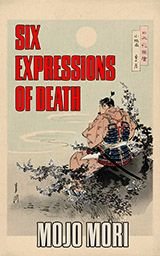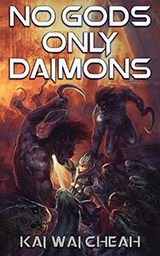
Six Expressions of Death is a solid debut work from Castalia House author Mojo Mori. Set in 16th century Japan, the story begins with the murder of a traveller on the road between the town of Morijuku and the village of Iwagi. When Daikawa Tadashi, a poor but noble samurai, investigates the murder, he quickly discovers there is more to the crime than a mere murder-robbery. Soon, he is embroiled in a complex web of deceit, intrigue and violence. Clan war is on the horizon, and shinobi stalk the night.
Six Expressions of Death is a taut, atmospheric murder-mystery set against the backdrop of the Sengoku period. Japan is still divided among daimyo, and powerful, ambitious clans like the Takeda are seeking to dominate the land. The book demonstrates a painstaking attention to detail, from architecture to artwork, cuisine to culture, immersing the reader into its setting.
Buddhism and folklore are key components of the narrative. The samurai view themselves as drifting within an ever-changing dewdrop world, recognising that their lives are brief and transient. The titular six expressions of death refer to belief among samurai that the faces of the dead hold portents for the future. While religion doesn't play a significant role in the narrative, it nonetheless informs how the characters think and act.
The Japanese obsession with honour, too, pervades the book. The warriors among the cast, for instance, strive to comport themselves with honour. Tadashi grapples with how to handle himself in the most honourable fashion, even as he deals with shinobi, whom he believes the most dishonourable of creatures. Likewise, when meditating on his relationship with his lover, he, too, tries to behave in a manner becoming of his ancient house. And of course, in the story, deceit and betrayal are seen as the most craven acts, while seppuku is always the final solution to regain one's honour.
The prose is tight and clean. There are no unnecessary scenes, no wasted words, and the narrative flows cleanly from one event to the next. Mojo writes with a strong, clear voice, imbuing the text with a heady mixture of mysticism and violence. The action scenes are quick and lethal, with individual combats often resolved in the space of a breath. As the mystery unfolds, plot twists come at surprising moments, yet every revelation is carefully thought-out and appropriately foreshadowed. My only quibbles come with the occasional use of Westernisms like 'sir' and 'Commissioner'; I would prefer the use of the original Japanese terms, but I recognise that such terms make it easier for non-Japanese readers to follow the story.
As I read the text, I'm reminded of Raymond Chandler's notes on the character of a private detective. To quote from the master:
But down these mean streets a man must go who is not himself mean, who is neither tarnished nor afraid... He is the hero, he is everything. He must be a complete man and a common man and yet an unusual man. He must be, to use a rather weathered phrase, a man of honor -- by instinct, by inevitability, without thought of it, and certainly without saying it. He must be the best man in his world and a good enough man for any world.
He is a relatively poor man, or he would not be a detective at all. He is a common man or he could not go among common people. He has a sense of character, or he would not know his job. He will take no man's money dishonestly and no man's insolence without a due and dispassionate revenge. He is a lonely man and his pride is that you will treat him as a proud man or be very sorry you ever saw him. He talks as the man of his age talks -- that is, with a rude wit, a lively sense of the grotesque, a disgust for sham, and a contempt for pettiness.
Daikawa Tadashi neatly fits into the the archetype. He routinely confronts danger and death, but he is neither afraid nor negatively affected by his encounters. Being a samurai he is educated in the way of the pen, the sword, the bow and the horse, and is prone to reciting haiku at the drop of a hat. He is born of high status, yet he is also a poor man not too far removed from commoners. While the people he encounters treat him with the respect he is due, he in turn does not mistreat them or take advantage of his station. He is, of course, a man of honour, and as such he despises deceit and holds weak people in contempt.
Throughout the story, Tadashi uses his wits as often as his weapons. A perceptive and intelligent man, he is quick to pick up clues and piece them together. He is also equally handy with bow and sword, able to match trained killers on their own terms. Readers accustomed to 'gritty' works or noir fiction might grouse that he is too perfect, but I would say that Tadashi strives to hold himself to the samurai ideal at all times.
The rest of the cast is also well-characterised, reflecting both their personalities and the norms of the times. There is the loyal and unflappable servant, the extroverted if somewhat unreliable comrade, the incompetent commissioner, the feminine and faithful lover.
A common complaint I've seen among other reviews is that the ending is anticlimactic. The true villain of the story is dealt with in a few placid pages. I can sympathise. Readers accustomed to Western-style action stories would expect an action-filled climax in which Tadashi personally delivers justice at swordpoint. However, this is a crime novel at heart. Violence is punctuation, not purpose; the story is not driven by the fight scenes, but rather by Tadashi's investigation. Likewise, as a poor country samurai, Tadashi's ability to confront the mastermind is sorely limited; if anything, I felt his method of bringing justice to the offender was particularly inspired. It was entirely within character and completely congruent with the setting.
Six Expressions of Death is a heady brew of logic, spirituality, treachery and combat. It comes highly recommended for readers who enjoy historical fiction and crime novels. It can be found on Amazon and the Castalia House store.
(Full disclosure: I am also published by Castalia House.)

If you would like to see the work I've published at Castalia House, you can pick up NO GODS, ONLY DAIMONS on Amazon and the Castalia House store. This one is for people who love urban fantasy, military science fiction, espionage and martial arts.
I would like to read it. Thank you for this review.
You're welcome!
This book sounds really interesting, adding it to my list, good job!
Thanks!